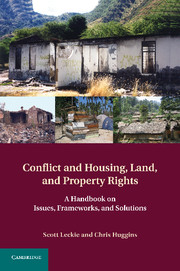Book contents
- Frontmatter
- Contents
- Opening Note and Acknowledgments
- Foreword by Dan Lewis
- 1 Introduction to the Issues – HLP Rights and Sustainable Peace
- 2 The International HLP Rights Normative Framework
- 3 Displacement, Conflict, and HLP Rights
- 4 HLP Restitution Rights
- 5 Restitution Mechanisms and Institutional Frameworks
- 6 United Nations and Other Peace Operations and HLP Rights
- 7 Protracted Displacement and Political Obstacles to the Protection of HLP Rights
- 8 Emerging Conceptual Issues
- 9 Improving International Responses to HLP Rights and Conflict
- Index
- References
3 - Displacement, Conflict, and HLP Rights
Published online by Cambridge University Press: 03 May 2011
- Frontmatter
- Contents
- Opening Note and Acknowledgments
- Foreword by Dan Lewis
- 1 Introduction to the Issues – HLP Rights and Sustainable Peace
- 2 The International HLP Rights Normative Framework
- 3 Displacement, Conflict, and HLP Rights
- 4 HLP Restitution Rights
- 5 Restitution Mechanisms and Institutional Frameworks
- 6 United Nations and Other Peace Operations and HLP Rights
- 7 Protracted Displacement and Political Obstacles to the Protection of HLP Rights
- 8 Emerging Conceptual Issues
- 9 Improving International Responses to HLP Rights and Conflict
- Index
- References
Summary
POPULATION DISPLACEMENT: A HISTORICAL OVERVIEW
Population displacement, especially that caused by conflict, is by no means a new phenomenon. History, including holy books such as the Bible and the Koran, are replete with examples of forced displacement during wartime. It has been argued, however, that the nineteenth century saw a massive increase in the numbers of people displaced around the world, in part because of innovations in technology: improvements in both means of transport and the machinery of war.
World War I led to the displacement and migration of some 10 million people, some 10 million Germans were expelled from Central and Eastern Europe in the years following World War II, and 15 million people moved as a result of the Partition of India in 1946. According to some estimates, the total number of people internally displaced globally was relatively low during the 1960s but increased significantly during the 1970s, before rising exponentially during the 1980s. However, the data should be treated with caution, because internal displacement in particular was not comprehensively monitored or studied until relatively recently.
The increase in population displacement during the 1970s and particularly the 1980s was caused, to a degree, by the proliferation of civil conflicts related to the Cold War. The Vietnam war led to massive internal displacement during the 1970s, and the people of neighboring Cambodia also suffered major displacement.
- Type
- Chapter
- Information
- Conflict and Housing, Land and Property RightsA Handbook on Issues, Frameworks and Solutions, pp. 92 - 120Publisher: Cambridge University PressPrint publication year: 2011
References
- 1
- Cited by



